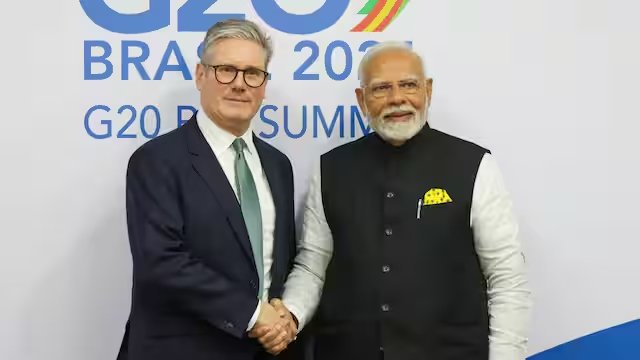New Delhi: Prime Minister Narendra Modi is embarking on his fourth official visit to the United Kingdom on July 23, 2025, marking a pivotal moment in the trajectory of India–UK relations. This visit comes at a time of renewed vigour in bilateral ties, driven by the successful culmination of the much-anticipated India–UK Free Trade Agreement (FTA) and the intensification of diplomatic engagement on key security and legal issues—including the matter of extraditing fugitives and addressing concerns about Khalistani extremism in the UK.
Prime Minister Modi and UK Prime Minister Keir Starmer have met twice over the past year, on the sidelines of the G20 Summit in Brazil and the G7 Summit in June 2025. Their frequent interactions, both in person and through regular telephonic conversations, signify a new phase of diplomatic engagement. During this visit, Modi will also meet with King Charles III and engage with business leaders from both countries, reflecting a holistic approach to strengthening India–UK ties.
The India–UK relationship has evolved into a Comprehensive Strategic Partnership, supported by five Ministerial-level Institutional Mechanisms spanning strategic, economic and finance, trade, energy, and science and technology domains. These frameworks provide structured avenues for dialogue and collaboration, ensuring the partnership is multifaceted and resilient.
The recently concluded India–UK FTA, finalised on May 6, 2025, represents a major leap forward in bilateral economic relations. The agreement aims to expand trade by £25.5 billion, building upon an existing £43 billion trading relationship. Notably, it eliminates tariffs on 99% of Indian exports to the UK and on 90% of UK exports to India, providing a major boost to businesses and employment in both countries.
Progressive removal/reduction of tariffs on 85% of tariff lines and 66% of existing Indian imports from the UK after a 10-year period.
Significant benefits for sectors such as food and drink, auto parts, machinery, medical devices, and whisky. For example, Indian tariffs on UK whisky will drop from 150% to 75% immediately and down to 40% over a decade.
Quota-based tariff reductions for auto imports, supporting premium UK brands and ensuring a phased transition to lower duties.
Enhanced access for Indian exports such as textiles, leather, footwear, gems, furniture, and chemicals—all with reduced or zero duties.
Sensitive sectors like dairy, apples, and certain industrial products remain protected by India, with an exclusion list for dairy, apples, and high-tech goods like smartphones and optical fibres.
Liberalisation of services trade covering IT, R&D, as well as professionals like chefs and yoga instructors, with provisions for reciprocal social security benefits for temporary workers.
The FTA reflects a careful balance between market access and sectoral safeguards and is projected to double bilateral trade to $120 billion by 2030.
A central discussion point during Modi’s UK visit is India’s concern over the presence and activities of Khalistani extremist groups in the UK. Foreign Secretary Vikram Misri emphasized that this matter, flagged repeatedly to UK authorities, affects not only India’s security but also the social cohesion and public order in the UK. The Indian side insists that Khalistani extremism, which threatens internal stability, should be regarded as a shared concern between both governments.
The issue of extraditing fugitives from the UK—individuals wanted by Indian law enforcement—is high on the agenda. India continues to press the UK for greater cooperation, citing precedents such as the recent extradition of Tahawwur Rana from the US. While acknowledging the legal complexities in the UK’s judicial process, Indian officials stress close ongoing coordination and hope for tangible progress.
The UK stands as the sixth-largest investor in India, with cumulative investments of $36 billion. Conversely, India has made significant inroads as a major investor in the UK, with FDI totalling nearly $20 billion. This reciprocal economic engagement underscores the deepening of trade and investment ties facilitated by institutional mechanisms and high-level visits.
The 17th UK-India Foreign Office Consultations and the inaugural Strategic Exports and Technology Cooperation Dialogue in June 2025 focused on trade, technology, defence, and people-to-people exchanges.
The FTA and associated Double Contribution Convention also include provisions for streamlined social security arrangements for multinational employees.
This official visit is expected to solidify the momentum in India–UK relations, with a focus on consolidating the new economic order underpinned by the FTA, addressing critical security concerns like Khalistani extremism, and fostering deeper cultural and technological collaboration.






